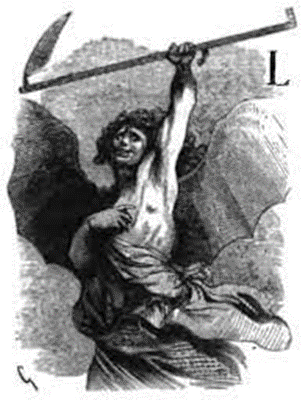This chapter opens with an image of the grim reaper, a trigger warning:
(The “L” that you see is the first initial of “La peste,” the plague).
At the outbreak of the COVID-19 pandemic, many Italian papers quoted this opening sentence in the headlines:
“La peste che il tribunale della sanità aveva temuto che potesse entrar con le bande alemanne nel Milanese, c’era entrata davvero.”
I was revising this chapter when the news broke in early 2020.
Manzoni criticizes earlier historians of the plague:
“No later writer has set out to examine and compare these accounts in order to depict a chain of events, a history of the plague.”
He makes modest claims for his own attempt:
“I have tried to put together not so much the account we need as one that has not yet been written.”
How shall we deal with the ongoing attempts to deny and rewrite our collective experience of the pandemic?
The response of the king to the suffering of his people sounds all too familiar:
“On the eighteenth of November, the Governor, oblivious or heedless of the danger of such a gathering in these circumstances, issued a decree in which he ordered public festivities to be held for the birth of Prince Carlos, the first son of King Philip IV. He specified that everything was to proceed according to custom, as if no health warnings had been issued.”
The devastating conclusion to this chapter:
“So at the beginning, no plague, absolutely not, by any count: The very utterance of the word was prohibited. Then came the ‘pestilential’ fevers, admitting the idea indirectly, through an adjective. And then, not an actual plague, well, yes, there was a plague, but only in a sense. Not a proper plague, mind you, but something for which there was no other name. Finally, it was a plague without a doubt and without dissent.”
And as we shall see:
“Another idea had already taken root, the idea of poison and sorcery, which distorted and confused the idea expressed in a word that could no longer be retracted.”
Join us on April 10 for a virtual discussion of The Betrothed with Michael F. Moore.







This chapter might have flagged for me if I hadn't been astonished at every turn how closely our plague echoed this one. There are too many lines to quote that could have been lifted from what has been or will be written about the pandemic.
This chapter: WOW. So . . . contemporary.